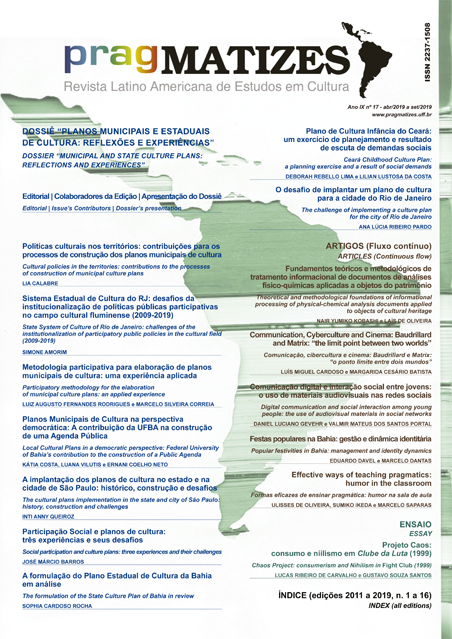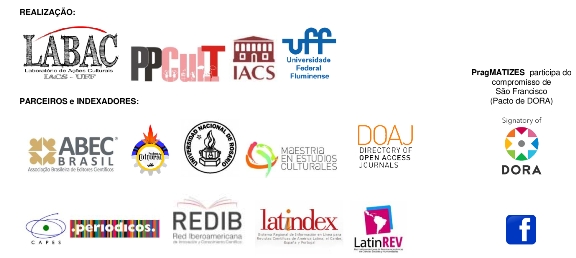Formas efectivas de enseñar pragmática: humor en el aula
DOI:
https://doi.org/10.22409/pragmatizes.v9i17.36388Palabras clave:
Pragmática, Enseñanza de inglés, Humor, Linguística sistémica-funcionalResumen
La pragmática tiene encuenta las relaciones entre los signos y sus usuarios, los hablantes. Cuando alguien dice "Gracias, no tengo hambre" en respuesta a la declaración "Dejaste la puerta abierta", estás cometiendo un error pragmático, porque en ese contexto "gracias no tengo hambre" es una respuesta inapropiada para el declaración "Dejaste la puerta abierta". Entonces, la pragmática es la dimensión del estudio de los idiomas que se ocupa de la relación entre los signos y sus usuarios en sus contextos concretos de uso, en otras palabras, es el estudio del uso del lenguaje en la comunicación, particularmente las relaciones entre oraciones y los contextos y situaciones en que se utilizan. La pragmática incluye el estudio de: (a) cómo la interpretación y el uso de los enunciados dependen del conocimiento del mundo real; (b) cómo los hablantes usan y entienden los actos de habla; y (c) cómo la estructura de las oraciones está influenciada por la relación entre el hablante y el oyente. Además, dentro de una perspectiva sistémica-funcional, el lenguaje es funcional (las personas usan el lenguaje con un propósito), semántico (el propósito es dar sentido e interactuar socialmente con otras personas), semiótico (hacer significado por elección) y contextual (pragmático) siendo que la interacción social influye y es influenciada por el contexto en el que se inserta. En esta línea de razonamiento, el objetivo de este trabajo es la consideración de que al enseñar la pragmática L2, la comunicación sociocultural y contextualmente apropiada (o inapropiada) dependerá de la enseñanza de la pragmática L2 en el aula en ciertos casos, ya que puede haber muchas formas pragmáticamente apropiadas de pedir información, programar una cita, etc. Teniendo esto en cuenta, nuestro corpus se basa en las expresiones y situaciones que se encuentran en la enseñanza del inglés como entorno L2. Nuestro contexto particular es el de una clase regular de inglés en una escuela privada de inglés en el estado de São Paulo, Brasil, en la que el maestro de L2 usó el extracto de la película Philomena y dibujos animados para enseñar inglés. Algunos resultados mostraron que la gran mayoría de los estudiantes investigados no podían distinguir las escenas humorísticas de las escenas de video y los dibujos animados antes de que su maestro de L2 les explicara las escenas / dibujos animados principalmente debido a problemas pragmáticos.Descargas
Citas
BARDOVI‐HARLIG, K. Developing L2 pragmatics. Language Learning, 63(s1), p. 68-86, 2013.
BURGERS, C.; VAN MULKEN, M. Humor markers. The Routledge handbook of language and humor, p. 385-399, 2017.
CRYSTAL, D. Internet linguistics: A student guide. London: Routledge, 2011.
EGGINS, S. Introduction to systemic functional linguistics. London: A&C Black, 2004.
FAIRCLOUGH, N. Critical discourse analysis: The critical study of language. Essex: Longman, 1995.
FILLMORE, C. J.; ATKINS, B. T. Toward a frame-based lexicon: The semantics of RISK and its neighbors. Frames, fields, and contrasts: New essays in semantic and lexical organization, 103, p. 75-102, 1992.
FLETCHER, C. V. et al. Establishing cross-cultural measurement equivalence of scales associated with face-negotiation theory: A critical issue in cross-cultural comparisons. Journal of International and Intercultural Communication, 7(2), p. 148-169, 2014.
FOWLER, R. Language in the News: Discourse and Ideology in the Press. Londpon: Routledge, 2013..
FOWLER, R. On critical linguistics in Texts and Practices: Readings in Critical Discourse Analysis. London: Routledge, 1996.
GLASBERGEN, D. Cartoon ID: toon-321. Glasbergen.com. Available at http://www.glasbergen.com/ngg_tag/office-humor-cartoons/nggallery/image/we-need-to-install-better-virus-software-another-computer-just-filed-a-disability-claim-2.
GOFFMAN, E. Frame analysis: An essay on the organization of experience. Cambridge: Harvard University Press, 1974.
GRABE, W.; KAPLAN, R. B. Writing in a second language: Contrastive rhetoric. In: JOHNSON, D. M.; ROEN, D. H. (eds.) Richness in writing: Empowering ESL students. London: Addison-Wesley Longman, 1989. p. 263-283.
HALLIDAY, M. A. Language as social semiotic. London: Edward Arnold & Co, 1978.
HAY, J. Functions of humor in the conversations of men and women. Journal of pragmatics, London, Elsevier, 32(6), p. 709-742, 2000.
KOVAZ, D.; KREUZ, R. J.; RIORDAN, M. A. Distinguishing sarcasm from literal language: Evidence from books and blogging. Discourse Processes, 50(8), p. 598-61, 2013.
LADUSAW, W. A. Expressing negation. Semantics and linguistic theory. Vol. 2. Maryland: University of Maryland Press, 1992. p. 237-260.
LI, J. Transitivity and lexical cohesion: press representations of a political disaster and its actors. Journal of Pragmatics, 42.12, p. 3444-3458, 2010.
Martin, J. R. 1992. “Genre and literacy-modeling context in educational linguistics”. Annual review of applied linguistics13: 141-172.
MARTIN, J. R.; WHITE, P. R. R. The evaluation of language: Appraisal in English. Hampshire: Palgrave Macmillan, 2005.
MARTIN, J. R.; WHITE, P. R. The language of evaluation (Vol. 2). Basingstoke: Palgrave Macmillan, 2003.
MINSKY, M. Frame theory. In: JOHNSON-LAIRD, P. N.;, P. C. Thinking: Reasings in Cognitive Science. Cambridge: Cambridge University Press, 1977. p. 355-376.
RICKS, D. A. Big business blunders: Mistakes in multinational marketing. London: Irwin Professional Publishing, 1983.
SCHMITZ, J.; TARTER, L.; SINE, J. Understanding the cultural orientations approach: An overview of the development and updates to the COA. TMC Inc., A Berlitz Company, 2012.
TANNEN, D. Conversational style: Analyzing talk among friends. Oxford: University Press, 1984.
VAN DIJK, T. A. Principles of critical discourse analysis. Discourse & society, 4(2), p. 249-283, 1993.
##submission.downloads##
Publicado
Cómo citar
Número
Sección
Licencia
Autores que publican en esta revista están de acuerdo con os siguientes términos:
- Autores mantienen los derechos autorales y conceden a la revista el derecho de propiedad, con el trabajo simultáneamente estando licenciado bajo Licencia Creative Commons Attribution que permite el compartimiento del trabajo con reconocimiento de la autoría y publicación inicial en esta revista.
- La revista se reserva el derecho de efectuar, en los originales, alteraciones de orden normativo, ortográfico y gramatical.
- Las pruebas finales no serán presentadas a los autores.
- Las opiniones emitidas por los autores son de su exclusiva responsabilidad.



